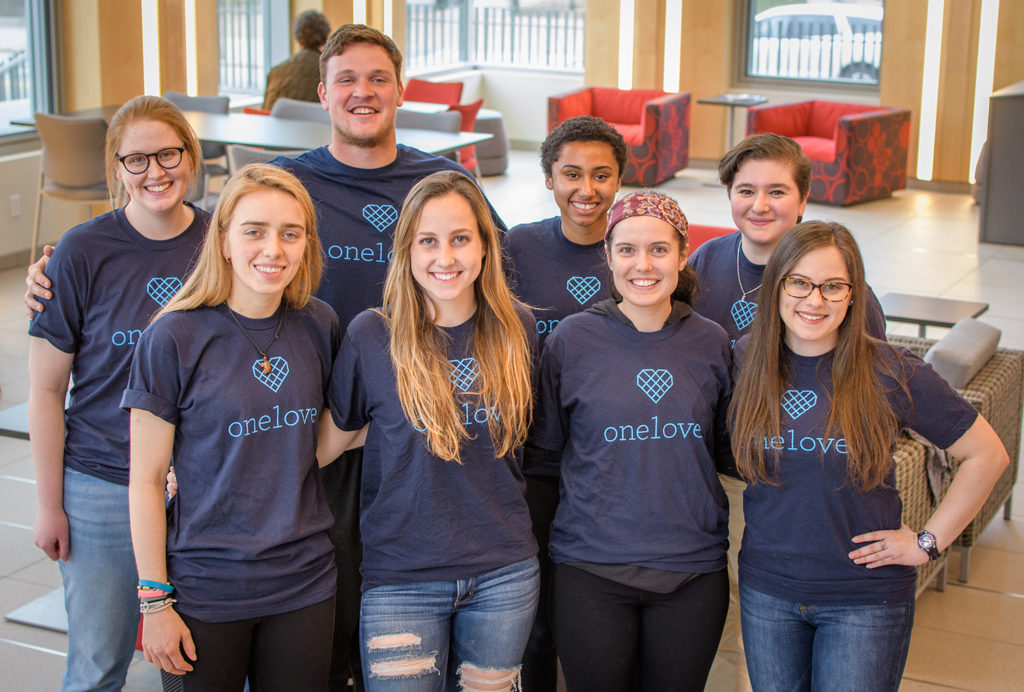Student-athletes lead education efforts to identify, prevent relationship violence

College student-athletes’ success might be determined by how quick they are on their feet, how willing they are to take risks, and how attentive they are to what is happening around them.
One might think it was these qualities that prompted Lynn Levey ’88, Clark’s Title IX coordinator and assistant dean of wellness, to turn to the members of Clark’s athletic community to rally against a different type of opponent: relationship violence. Levey has been closely watching the issue since May of 2010, when female student Yeardley Love was murdered by her abusive ex-boyfriend her senior year at the University of Virginia; both were lacrosse players. Levey followed the highly publicized trial while on the faculty at Syracuse University College of Law — where she taught a course on the Violence Against Women Act — and authored a blog post following the verdict.
Following their daughter’s death, Yeardley Love’s family established the One Love Foundation, and with it, an educational and training program designed to teach young people how to identify the signs of relationship violence and facilitate open discussions about the topic to share resources and strategies for intervention, with the goal of preventing other incidents like Yeardley’s.
This year, Levey — who played volleyball at Clark — recruited a team of her own, and selected Athletics Director Trish Cronin, Title IX/Wellness Program Manager Elyana Kadish ’17/ M.A. ’18, and several Clark coaches to familiarize themselves with the One Love program and then share it with Clark student-athletes. The two-part program involves watching a short fictional film about an abusive relationship that also illustrates strategies for intervention and peer-led group discussions. After viewing the film, 17 student-athletes volunteered to be trained and serve as peer facilitators to bring the One Love program to Clark’s 340 student-athletes. The peer facilitators led discussions about the film that allowed students to share their perspectives, learn about on- and off-campus resources that can help those who are struggling, and discuss the shame that accompanies intimate partner abuse.
Lacrosse player Brandon King ’19 says, “Being part of the One Love team at Clark has been one of the most fulfilling experiences I’ve had here. The lessons I learned and taught through the program are extremely important for every college student. … I hope to see the program grow at Clark and on all college campuses around the country.”
Anjelica Gonzalez ’18, MBA ’19, a field hockey player, described her experience as a workshop facilitator for One Love as “eye-opening and extremely rewarding.”
“I was originally drawn to the opportunity to facilitate after witnessing, to my surprise, the willingness and passion of my fellow Clark athletes in participating in the difficult, yet important, conversation about dating violence,” says Gonzalez. “I am so happy that my university is taking part in a powerful movement to end dating violence, and I am honored to have been part of the first steps of the journey at Clark.”
Levey says the students “enthusiastically embraced” the One Love program. Emma Bulman ’20 notes that sharing it with other Clark students was beneficial because it was “far more engaging than programs we have done in the past.”
Bulman, who is a member of Clark’s Swimming and Diving Team, said she was vaguely familiar with the Yeardley Love case before she came to Clark.
“I remember hearing about this story on the news and from my mom when I was younger, but I didn’t understand the situation, or relationship violence, as well as I do now,” she says.
Besides learning more about an important issue and being trained to identify and assist others in need, Bulman discovered something else that was positive about her work as a peer facilitator.
“I got to pair up with other athletes that I don’t have a lot of opportunities to interact with,” she explains. “Working with Sarah [Berube ’21] and Nate [Maselek ’19] was a lot of fun.”
Berube plays on the women’s soccer team.“So many people I talked to said they did not think of relationship violence as a real problem until they saw the end of the film when names and faces of several victims flash across the screen,” she says. “Sexual assault and relationship violence are not easy subjects to discuss, but I know that afterward, every athlete left that room more aware and better equipped to handle any form of relationship violence they may encounter.”
Levey was pleased that the One Love program was so successful this year. Beginning this fall, One Love training will be required for all students as part of campus programming initiatives around sexual and dating violence.
“Yeardley Love’s murder was a watershed moment for those of us who work with students at universities to encourage us to speak more directly about the perniciousness and prevalence of partner abuse, and the damage it does in our communities,” says Levey. “I’m proud of how our athletic community came together to share these important resources and lessons with their peers. It’s just another example of how Clark students are willing to work together to tackle important issues that matter to our community and beyond.”


